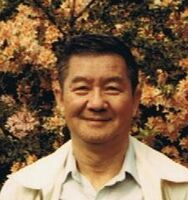Garma Chen-Chi Chang
| PersonType | Category:Authors of English Works Category:Professors Category:Translators |
|---|---|
| FirstName / namefirst | Garma Chen-Chi |
| LastName / namelast | Chang |
| MainNamePhon | Garma Chen-Chi Chang |
| MainNameChi | 张澄基 |
| MainNamePin | Zhāng Chéngjī |
| SortName | Chang, Garma |
| bio | Garma Chen-Chi Chang was Emeritus Professor of Religious Studies at the Pennsylvania State University and a renowned Buddhist scholar. His books include The Buddhist Teaching of Totality and The Practice of Zen, as well as his English translation of the Tibetan classic, The 100,000 Songs of Milarepa. (Source Accessed May 20, 2021) |
| YearBirth | 1920/08/28 |
| YearDeath | 1988/05/24 |
| BornIn | Shanghai, China |
| associatedwebsite | Wikipedia Page |
| IsInGyatsa | No |
| Other wikis |
If the page does not yet exist on the remote wiki, you can paste the tag |
Full Name
Garma C. C. (Chen-Chi ) Chang
Chʻêng-chi Chang
Garma is his Dharma name from Tibetan.
Dates
Died May 25, 1988
Affiliation
The Buddhist Association of the United States
Other Information
Biographical note from Teachings of Tibetan Yoga:
"The author-translator of this book was born in China into a highly-placed family some forty years ago. In early youth he broke out of this pattern to become the disciple of a Buddhist Guru, in a part of China near Tibet. His Guru sent him to Tibet to further his training. After eight years in Tibetan monasteries, six of them under one Guru, he came West to study animal husbandry and to bring this knowledge back to Tibet. The Communist victory in China and the Communist invasion of Tibet cut him off from return."
Short list of works:
The Hundred Thousand Songs of Milarepa
The Buddhist Teaching of Totality: The Philosophy of Hwa Yen Buddhism
The Hundred Thousand Songs of Milarepa Volume Two
The Practice of Zen
The Six Yogas of Naropa & Teachings on Mahamudra
Teachings of Tibetan Yoga
Teachings and Practice of Tibetan Tantra (Eastern Philosophy and Religion)
A Treasury of Mahayana Sutras: Selections from the Maharatnakuta Sutra

